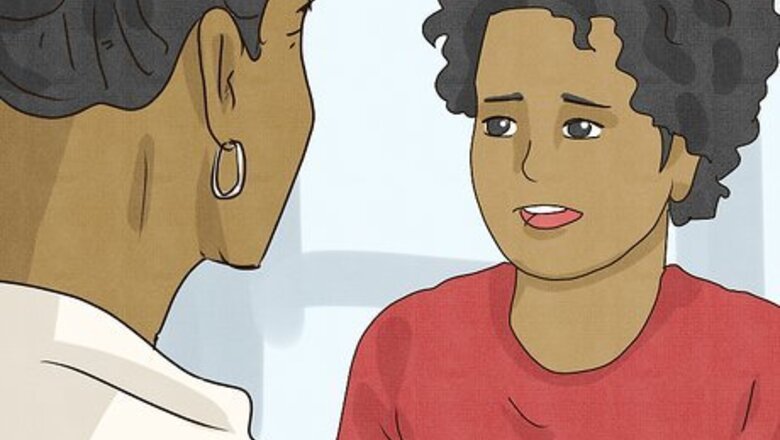
views
Talking with Your Child

Listen to your child when they come out. If your child comes to you and wants to talk about their sexuality, do your best to give them the space to talk. Let them talk uninterrupted so they really feel like you’re hearing them. Put down distractions, try not to interrupt, and give them your full attention until they’re done. Make eye contact and ask follow-up questions to show that you’re listening. You might ask things like, “Could you tell me more about that?” or, “I’m not sure I understand. Could you explain that more?”

Thank them for opening up to you. Coming out isn’t easy, and it was probably hard for your child to do. Even if you aren’t quite sure about their identity or what it means, tell your child that you appreciate them coming to you. That way, they’ll feel safer talking to you in the future. You might say, “Thank you for trusting me enough to tell me this. I know this probably wasn’t easy for you.” Or, “I really appreciate you confiding in me.”

Tell your child that you love them. Unconditional love is important for any child, no matter how old. If they weren’t sure how you’d react or what you’d think about them, they might be worried that their sexuality could affect your relationship. Tell them that you’ll always love them no matter what, and their identity doesn’t change that. You could try, “I’ll always love you, you know that, right?” Or, “This doesn’t change how much I love you. You’ll always be my child.”

Apologize if you reacted poorly at first. You can’t change what happened, but you can say you’re sorry. If you felt shocked, angry, or confused when your child first came out, you might not have reacted very well. If that’s the case, sit your child down and apologize for how you acted. Explain what you were going through, but don’t make excuses. Try something like: “I’m really sorry that I yelled at you last week when you first came out. I was surprised and a little upset, but I shouldn’t have reacted that way.” “I didn’t mean to brush you off the other day when we were talking. I want you to know that I support you, and I hope you feel comfortable talking to me about this kind of stuff.”

Check in with your child often. Keep an open line of communication in case they want to talk again. Children are often changing, and their sexuality or gender expression might vary over time. Ask your child how they’re doing or if there’s anything they want to talk about with you, just in case they have more to share. You might ask something like, “How’s everything been going lately?” or, “Is there anything you’d like to chat about?”
Supporting Your Child

Support their sexuality, even if you don’t understand it. You don’t have to know everything about the LGBT+ community to accept your child. If you don’t understand something, it can be easy to reject it completely. However, try to accept what your child tells you, and ask them questions if you don’t understand something. Chances are, they’ll be happy that you’re trying to understand them, and they’ll explain it as best they can. For instance, if you don’t understand what your child’s sexuality means, you might ask them, “Could you explain what being bisexual means? I’ve heard the term, but I’m not really sure what it means for you.”

Avoid questioning their sexuality. Don’t tell your child that what they identify as is “just a phase.” Hearing that their sexual identity isn’t valid can be very hamrful for children. Even if you think that their sexuality might change over the years, don’t tell them that. Accept them for who they are now so they feel totally supported and loved. This is especially true if your child identifies as bisexual. Bisexual people often hear that their sexuality is “just a phase,” and that they’ll eventually be either straight or gay. However, this isn’t true, and many people identify as bisexual their entire lives.

Encourage your child’s self-expression. They may experiment with how they dress or what they look like. Self-expression isn’t necessarily tied to sexuality, but you might notice your child changing up how they look to better match how they feel on the inside. Try to be supportive of these changes, and let them figure out who they are on their own terms. For instance, if your child wants to change up their wardrobe, you might take them on a shopping spree. If they want to dye their hair, you could make them an appointment at a local salon.

Advocate for your child at school. LGBT+ youth are more likely to be bullied. Make sure that your child feels safe when they’re in class, and check in with them often about their friends and who they hang out with. If your child is being bullied, talk to their teachers or the principal to stop the behavior before it gets worse. Kids often don’t want to open up about being bullied. You can watch for signs that they might be having trouble at school, like a loss of appetite, trouble sleeping, frequent stomach aches, or self-destructive behaviors.

Let your child come out to other people on their own. Your child is the only one who can make the decision to come out, so try to respect that. Just because they came out to you doesn’t necessarily mean they’ll want to come out to their friends, siblings, or teachers. If you aren’t sure who your child has told about their sexuality, be sure to ask them before you talk about it with anyone else. You might say something like, “I’m excited to see your friends! Have you come out to any of them yet? I don’t want to say the wrong thing if you haven’t.”
Educating Yourself

Research any questions that you might have online. You might not know everything about the LGBT+ community, and that’s okay. If you have questions that you aren’t comfortable asking your child, head to Google and look them up. There are tons of free resources online for parents that you can peruse, and they can help teach you about sexuality, gender expression, and LGBT+ terminology. Try looking at sites like Advocates for Youth, The Family Acceptance Project, and Parents, Families, Friends, and Allies of Lesbians and Gays (PFLAG).

Talk to friends and family members in your position. You probably know someone whose child is part of the LGBT+ community. If you do, try chatting with them and asking them what their experience has been like. You two can talk about how you’re adjusting and how your children are doing, too. The more you talk with other people, the better. You could also talk to friends and family members who are part of the LGBT+ community themselves. They might have some valuable insight that could help you out.

Examine your own feelings surrounding love and sexuality. If you have hang-ups about your child’s sexuality, ask yourself why that is. Maybe you just don’t know a ton about LGBT+ sexualities, or maybe you never thought your child would identify as anything except heterosexual. Sit down with yourself and really do a deep dive into your thinking. The more you can address these deeper questions, the better you’ll be able to accept your child. Your religion or political views may also play a role in how you view the LGBT+ community.

Make an appointment with a mental health professional if you need to. It can be tough to change your world views at the drop of a hat. If you’re struggling (and there’s no shame in that), make an appointment with a therapist. They can help you work through your emotions and come up with specific ways to move forward and keep loving your child.
















Comments
0 comment